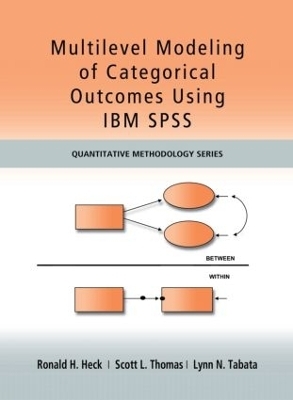
Multilevel Modeling of Categorical Outcomes Using IBM SPSS
Routledge (Verlag)
978-1-84872-955-1 (ISBN)
The book opens with a review of multilevel with categorical outcomes, followed by a chapter on IBM SPSS data management techniques to facilitate working with multilevel and longitudinal data sets. Chapters 3 and 4 detail the basics of the single-level and multilevel generalized linear model for various types of categorical outcomes. These chapters review underlying concepts to assist with trouble-shooting common programming and modeling problems. Next population-average and unit-specific longitudinal models for investigating individual or organizational developmental processes are developed. Chapter 6 focuses on single- and multilevel models using multinomial and ordinal data followed by a chapter on models for count data. The book concludes with additional trouble shooting techniques and tips for expanding on the modeling techniques introduced.
Ideal as a supplement for graduate level courses and/or professional workshops on multilevel, longitudinal, latent variable modeling, multivariate statistics, and/or advanced quantitative techniques taught in psychology, business, education, health, and sociology, this practical workbook also appeals to researchers in these fields. An excellent follow up to the authors’ highly successful Multilevel and Longitudinal Modeling with IBM SPSS and Introduction to Multilevel Modeling Techniques, 2nd Edition, this book can also be used with any multilevel and/or longitudinal book or as a stand-alone text introducing multilevel modeling with categorical outcomes.
Ronald Heck is professor of education at the University of Hawai‘i at Mānoa. His areas of interest include organizational theory, leadership, policy, and quantitative research methods. Scott L. Thomas is professor in the School of Educational Studies at Claremont Graduate University. His specialties include sociology of education, policy, and quantitative research methods. Lynn Tabata is an affiliate graduate faculty member and research consultant at the University of Hawai‘i at Mānoa. Her research interests focus on faculty, distance learning, and technology issues in higher education.
1. Introduction to Multilevel Models with Categorical Outcomes. 2. Preparing and Examining the Data for Multilevel Anayses. 3. Specification of Generalized Linear Models. 4. Multilevel Models with Dichotomous Outcomes. 5. Multilevel Models with a Categorical Repeated Measures Outcome. 6. Two-Level Models with Multinomial and Ordinal Outcomes. 7. Two-Level Models with Count Data. 8. Concluding Thoughts.
| Reihe/Serie | Quantitative Methodology Series |
|---|---|
| Verlagsort | London |
| Sprache | englisch |
| Maße | 210 x 280 mm |
| Gewicht | 1420 g |
| Themenwelt | Geisteswissenschaften ► Psychologie |
| Mathematik / Informatik ► Mathematik ► Computerprogramme / Computeralgebra | |
| Sozialwissenschaften ► Soziologie ► Empirische Sozialforschung | |
| ISBN-10 | 1-84872-955-3 / 1848729553 |
| ISBN-13 | 978-1-84872-955-1 / 9781848729551 |
| Zustand | Neuware |
| Informationen gemäß Produktsicherheitsverordnung (GPSR) | |
| Haben Sie eine Frage zum Produkt? |
aus dem Bereich


